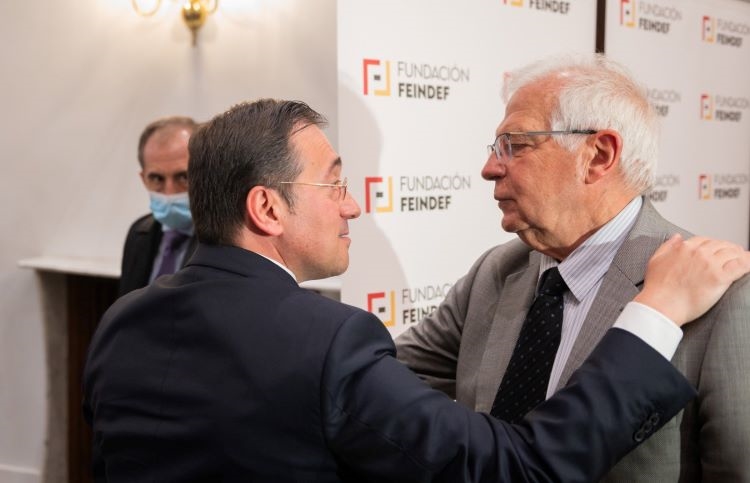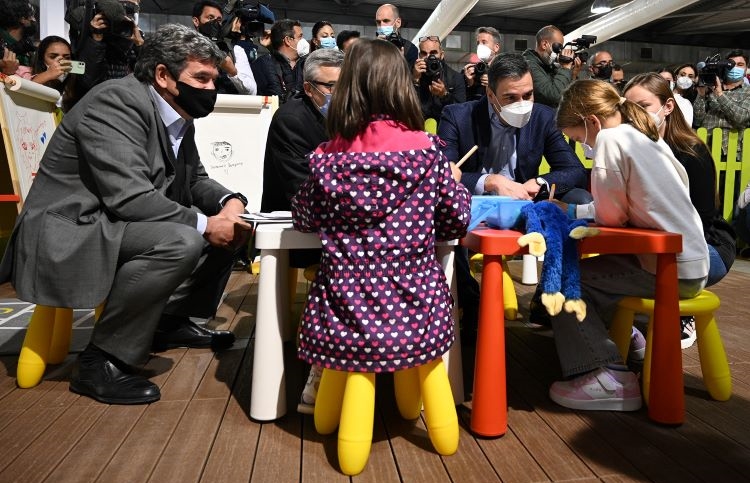Eduardo González
The EU High Representative for Foreign and Security Policy, Josep Borrell, and the Minister of Foreign Affairs, José Manuel Albares, agreed yesterday that the invasion of Ukraine represents a new stage in the European security and defense strategy and that Spain can play a “fundamental role” in this process, especially during the upcoming NATO Summit in Madrid and the Spanish Presidency of the EU in 2023.
“The war in Ukraine has redefined and altered the military landscape of Europe and will continue to do so in the coming years,” warned Josep Borrell during his speech at the conference The Strategic Compass of the European Union, organized by the FEINDEF Foundation at the headquarters of the Centro Superior de Estudios de la Defensa Nacional (CESEDEN) in Madrid. The event was presented by the president of FEINDEF, the former Minister of Defense Julián García Vargas.
“Europe is stronger after the Ukraine crisis out of necessity,” he stressed. “It has acted with unprecedented speed and determination and is supporting Ukraine without engaging in belligerence, because we do not want the war to spread horizontally to other countries or vertically with an increase in the capacity of the weapons being used,” he continued. Furthermore, he said, “Europe must be a provider of security not only for Europeans, but for a peaceful world”.
In the face of these challenges, Borrell said, the EU Strategic Compass – the “white paper” on European defense between now and 2030, which was approved on March 24 – represents “a before and after for the defense and security of Europe and a sign of unity and determination” at a time when “Europe is in danger”. “Never before has a European defense document been approved at this political level” and Spain, “as the driving force behind the common security and defense policy, is called to play a fundamental role in the implementation of the Compass,” both during the NATO Summit (to be held at the end of June) and during the Presidency of the EU Council (in the second half of 2023), continued Borrell, who was Spanish Foreign Minister between 2018 and 2019.
According to Borrell, the Strategic Compass presents “four pillars: reinforcing the capacity to act, guaranteeing European security, improving investment in capabilities and working with our partners, the most important of which is NATO, but not the only one.” Regarding the first pillar, he recalled, Europe “participates in 18 missions and has participated in 37 missions since 2003.” “Spain plays an important role in this context, because it is one of the leading contributors to these European missions, contributing 22% of the personnel deployed, 36% if we stick to strictly military missions.”
Borrell also warned of the need to “invest in the increase and modernization of capabilities” to “mitigate strategic dependencies, which are many“. “In Europe it is difficult to win elections by touting increased military spending, but there comes a time when it is necessary to ensure the survival of the European model, which, if it is in danger, must be defended,” he said. It is “a threat of such a caliber that no State can face it alone” and, therefore, “all States have increased defense spending, even Germany, the most reluctant, and Spain is no exception”, continued the high representative, who praised “the announcement of the President of the Government, Pedro Sánchez, to progressively increase spending to reach 2% of GDP in the coming years”.
Albares: “The unity that exists between partners and allies we need within Spain”
At the same event, José Manuel Albares agreed with Borrell that “the war has changed forever our way of seeing European defense and the way we perceive ourselves and our environment”, because “there is much more at stake in Ukraine than the territorial integrity and sovereignty of a country, it has been an unmitigated attack on all the principles with which we live and which govern the European order”.
According to the Minister, the “reaction of Spaniards and Europeans” has resulted in “decisions that months and even weeks ago were unthinkable”, such as “a battery of unprecedented sanctions against Russia, the defense of values and security over economic interests and the shipment of weapons financed by a European instrument, all from the unity and consensus with European partners and transatlantic allies”. “That unity is what we need here inside, in Spain,” declared Albares, who also highlighted the “complementarity between the EU and NATO” in the response to Russia, because “without the participation of the EU with the European Fund for Peace and without the battery of sanctions, NATO’s deterrent efforts would not be so decisive.”
“Spain cannot be oblivious, it must lead” this process, he said. “The chance of history has placed us in it in this complex context, because Spain will host the NATO Summit in June and is preparing to, fifteen years later, preside over the EU,” he continued. “Spain has to be up to these times because we have a lot at stake” and because “the new political era of European security and defense cannot be done without Spain,” he added.
Albares also agreed with Borrell on the need to reinforce military capabilities, as envisaged in the Strategic Compass, because “the EU’s geopolitical aspirations are unthinkable without the muscle to back them up”. This increase in defense capabilities must be accompanied by the need to “overcome industrial fragmentation and strengthen the defense industrial base”, because “true strategic autonomy requires a strategic industry”.
With regard to the commitment to reach 2% of GDP in defense spending, Albares assured that “the President of the Government was very clear about this” and that Spanish society itself is aware of this need, because “the crisis in Ukraine has highlighted a more acute perception of threats for the citizens, who have discovered that war, which we thought had been completely banished from Europe, has returned with crudeness”, and, therefore, they understand “the need to equip themselves with the necessary capabilities to guarantee the security of the European order”.






